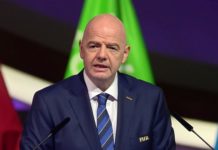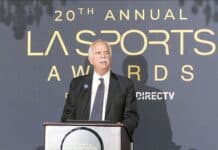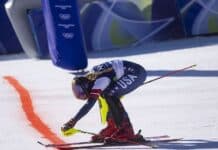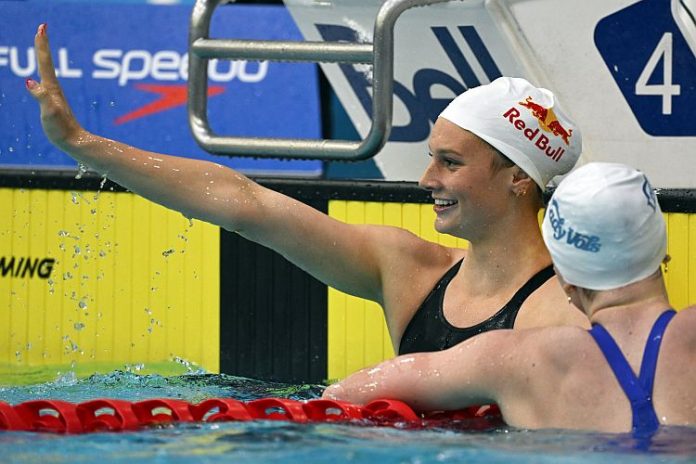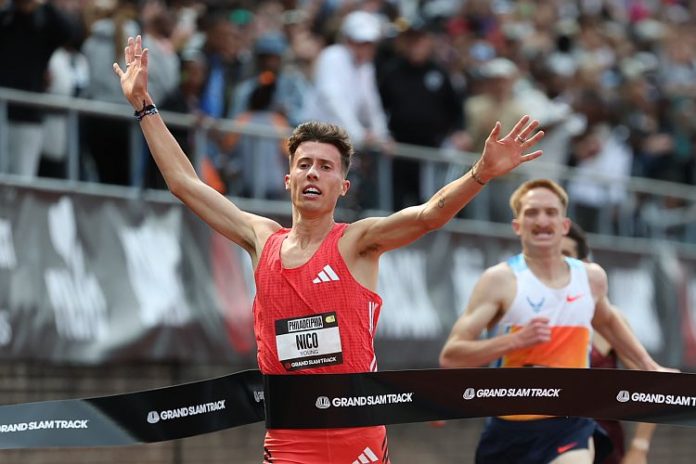★ The Sports Examiner: Chronicling the key competitive, economic and political forces shaping elite sport and the Olympic Movement.★
★ To get the daily Sports Examiner Recap by e-mail: sign up here! ★
≡ NO OLYMPIC MONEY IN BUDGET ≡
A 59-page “highlights” summary of the Fiscal Year 2026 budget proposal from the U.S. Department of Transportation outlined $147.1 billion in spending for the new budget year that begins on October 1, 2025.
There was no mention of any spending request for assistance to the 2028 Olympic Games in Los Angeles, despite a highly-publicized ask for $3.2 billion from the Los Angeles Metropolitan Transportation Authority.
On Wednesday, Metro confirmed to The Sports Examiner:
“In response to your inquiry the President’s budget doesn’t include mobility-related funding recommendations for the 2026 FIFA World Cup and the 2028 Olympic and Paralympic Games.
“Consistent with Metro’s Board-approved 2025 Federal Legislative Program, we continue to advocate – with both Congress and the Executive Branch – for federal transportation funding to be provided for the 2028 Olympic and Paralympic Games – in the FY2026 transportation spending bills that will be considered by Congress in the coming months.”
That’s bad news for Metro, but was telegraphed by Transportation Secretary Sean Duffy in his 14 May testimony; responding to a direct question about FIFA World Cup 2026, the 2027 NFL Super Bowl and the 2028 Olympic Games by Rep. Pete Aguilar (D-San Bernardino), Duffy replied:
“I haven’t looked at the funding levels and what’s appropriate from the department’s
perspective but I want to make sure we have enough resources to make sure it’s seamless and I’d love to work with you if you have some ideas.”
Aguilar pressed for a commitment to $500 million, but Duffy said he’d be happy to chat later.
This is the second straight Transportation Department budget with no Olympic support for Metro; a $200 million request from the Senate for the FY25 budget did not make it into the final spending bill.
So, Metro is left to try and lobby Congress and the Trump Administration to try and add some money in during the legislative process over the summer. And both Metro and the LA28 organizing committee expect Federal assistance.
● Metro’s request for $3.2 billion included three areas identified in December 2022 as “Specific Games delivery need” items: the Supplemental Bus System, Countywide Mobility Hubs and Games Route Network Design and Implementation. Those three area were estimated to cost $755 million then, but the estimate for the same projects in May 2025 had risen to $2.306 billion based on the current “order of magnitude” estimates:
● $2,015.5 billion: Games Enhanced Transit System (buses)
● $80.0 million: Metro Mobility Hubs
● $210.9 million: Games Route Network
A note at the end of a 14 May 2025 report attachment memo, “Games Enhanced Transit Service (GETS) Workstream Update,” stated that Metro has to get the money to operate its Olympic Games system from somewhere:
“Building upon the precedent set in the Games Agreements between LA28 and venue cities, where LA28 commits to reimbursing for increased municipal services, Metro is pursuing a reimbursement agreement for the Games Enhanced Transit Service (GETS). This additional service represents a financial burden for Metro that would not otherwise be needed if not for the 2028 Games. This agreement will be part of the MOU that is executed between Metro and LA28.”
● In the meantime, LA28 also expects Federal assistance. At the 5 June news conference at the end of the sixth International Olympic Committee Coordination Commission meeting in Los Angeles, LA28 Chair Casey Wasserman’s reply to a question about transportation included:
“[W]we are very clear that [the free-flowing transit during the 1984 Olympic Games] was a great experience and we’ll do our best to replicate that. We feel very confident in the plan.
“Obviously, L.A. has invested unto itself a lot in infrastructure here, in transportation infrastructure, far more than existing in ‘84, and that, combined with the support of the Federal government around our transportation delivery, we feel very confident that it will be a different version of the success we had in ‘84 in terms of ingress and egress and access and experience when it comes to transportation.”
¶
There is precedent for Federal support for transportation to support Olympic and Paralympic Games operations in host cities. According to a Government Accounting Office report in 2000:
● For Los Angeles 1984, no Federal money was sought or received for transportation support. Federal spending was centered on $45 million (1984 dollars) spent for security and safety services.
● For Atlanta 1996 (1999 dollars shown, original amounts were less):
“According to DOT officials, during the 1996 Summer Olympic and Paralympic Games in Atlanta, an estimated 11 million spectators made an estimated 25 million transit trips on a transportation system that was principally funded and supported by the federal government.
“Specifically, DOT provided approximately $17 million to state and local transit and transit planning agencies to pay for the delivery, operation, and return of the 1,500 buses, which were borrowed from communities throughout the United States. These buses were used as the principal transportation system for Olympic spectators and Paralympic athletes. The local transit agencies allocated and used about $11 million for the regular Olympic Games and about $6 million for the Paralympics Games.”
The Federal government also spent about $1 million to provide 1,000 military service members as drivers, and $1.6 million was spent for highway signage by the Dept. of Transportation.
Three transit projects already being built in the Atlanta area with Federal funds were accelerated, with $114 million in spending.
● For Salt Lake City 2002:
Existing highway and mass transit projects were accelerated with an estimated $998 million in funding and $20 million to build two access roads for Games use.
In terms of spectator transportation assistance:
“As of April 2000, the federal government planned to provide about $77 million to assist with providing spectator transportation to the 2002 Winter Olympic Games and to help enhance the access or use of venues for the Games.
“Specifically, federal transit officials plan to request $47 million in federal funding and support from Congress for a spectator transportation system, park and ride lots, and other infrastructure improvements associated with the 2002 Winter Olympics. As of April 2000, DOT had provided about $3 million for the spectator transportation system.
“Although the planned Olympic transportation system is to principally consist of borrowed transit buses, which was the case for the 1996 Olympic Games in Atlanta, the Salt Lake City system is estimated to cost 5 times as much.
“In total, SLOC plans to request about $91 million from the federal government for the spectator transportation system to be used during the Games. This funding would be used to pay for transporting the borrowed buses to and from Salt Lake City, additional bus drivers, bus maintenance, construction and operation of park and ride lots, and loading and unloading facilities that are planned to service four of the Olympic venues located in rural, difficult-to-reach areas.”
The $77 million figure included the $47 million request for spectator transit, the $20 million for access roads and $10 million for transportation plan development. A 2001 update showed a planned total cost of $48.5 million (in 2001 dollars) for spectator transportation system costs.
There was no follow-up GAO report on actual spending for the 2002 Winter Games. Obviously, however, the amounts being requested by Metro for 2028 are far, far more than what was provided from Washington for 1996 or 2002.
¶
★ Receive our exclusive, weekday TSX Recap by e-mail by clicking here.
★ Sign up a friend to receive the TSX Recap by clicking here.
★ Please consider a donation here to keep this site going.
For our updated, 694-event International Sports Calendar for 2025 and beyond, by date and by sport, click here!










